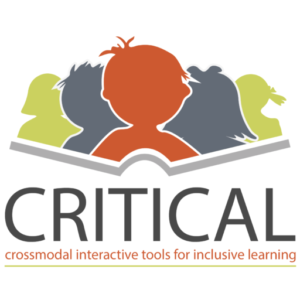Welcome to the Crossmodal Interactive Tools for Inclusive Learning (CRITICAL) project page, an EPSRC-funded research project led by Dr Oussama Metatla and hosted at the Department of Computer Science, University of Bristol.
A large number visually impaired and blind children in the UK are educated in mainstream schools, which often takes the form of one or two learners in a class of fully sighted peers. But typical accessibility solutions that are available in mainstream schools are designed to be used by visually impaired learners alone and not by their sighted peers, and so can end up forcing them to learn as isolated individuals and be excluded from group learning activities. These solutions emphasise accessibility over inclusion, focusing on an individual’s disability and not on the variety of abilities present in a social context of group learning involving students, teachers and technology.
 CRITICAL aims to research and develop interactive learning tools to make group work in mixed classrooms more inclusive of visually impaired students.
CRITICAL aims to research and develop interactive learning tools to make group work in mixed classrooms more inclusive of visually impaired students.
The project explores questions such as: How do people learn together when they have access to different sets of sensory modalities? And, how can we exploit crossmodal interaction to design more inclusive collaborative user interfaces?
Non-visual modalities (e.g. audio, gestures, haptic and tactile feedback) have already shown potential benefit to support accessible interactions, but there are still limitations in their applicability in real world settings, such as issues with crossmodal effects when groups work together using different senses. We will use an iterative user-centred approach combining participatory design activities with empirical research into crossmodal interaction to find out how different senses can be effectively integrated with visual capabilities to support group work. The tools will be designed to address gaps in technological support for accommodating curriculum requirements and social processes surrounding collaborative learning, and will be validated in classroom settings to find out how they can improve group learning activities and impact teaching practices.
CRITICAL is funded by an EPSRC Fellowship grant (EP/N00616X/2)
